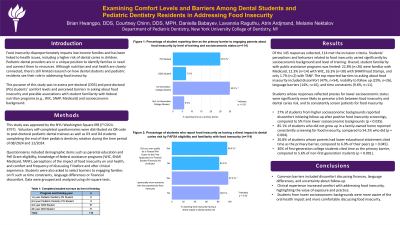Other
390 - Examining Comfort Levels and Barriers Among Dental Students and Pediatric Dentistry Residents in Addressing Food Insecurity


Brian J. Hwangpo, DDS
Pediatric Dental Resident
New York University, New York, NY
New York University
New York, New York, United States- CC
Courtney Chinn, DDS, MPH
New York University, New York, NY
New York, New York, United States - LF
Lauren M. Feldman, DMD, MPH
Pediatric Dentistry Program Director
New York University
New York City, New York, United States
Presenting Author(s)
Research Mentor(s)
Program Director(s)
Background: Food insecurity (FI) disproportionately affects low-income families and is associated with increased risk of dental caries in children. Pediatric dental providers are uniquely positioned to identify and support families facing FI, yet little is known about how dental trainees perceive their role in addressing this issue.
Objective: This study assessed pre-doctoral (DDS) and post-doctoral pediatric (PG) dental trainees’ comfort in screening for FI, perceived barriers, and associations with socioeconomic background and familiarity with public assistance programs (e.g., WIC, SNAP, Medicaid).
Methods: A cross-sectional survey was administered from August to December 2024 to dental (D3/D4) students and pediatric dental residents at NYU. The questionnaire assessed demographics, knowledge of federal nutrition programs, perceptions of FI’s impact on oral health, and comfort levels discussing FI. Responses were analyzed using chi-square tests.
Results: Of 145 responses, 114 met inclusion criteria. Familiarity with assistance programs was limited, with fewer than 30% of students familiar with any one program. Discomfort (47%), uncertainty about follow-up (23%), language barriers (14%), and time constraints (9.6%) were the most cited barriers. Students from lower socioeconomic backgrounds were more likely to screen for FI and recognize its link to oral health. Significant differences emerged by background, including:
Higher screening rates among students not raised in family-owned homes (85.1% vs. 54.2%, p = 0.004)
Less discomfort following up on FI among lower SES students (5% vs. 27%, p = 0.035)
First-generation and lower parental education students more likely to cite time as a barrier (p = 0.001, p = 0.045, respectively)
Conclusions: Despite limited knowledge of assistance programs, dental students recognize the importance of addressing FI. Clinical experience increased comfort discussing FI, and students from lower SES backgrounds demonstrated greater engagement. These findings support the need for formal FI training in dental education, especially for students from more advantaged backgrounds.
Identify Supporting Agency and Grant Number: N/A

.jpg)